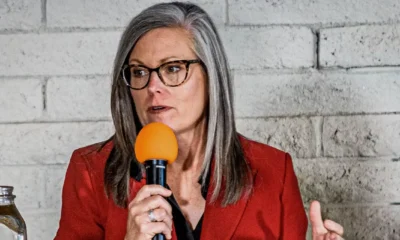Business
Tucson’s Bold Initiative: Community Fund Launches to Support Bail for Pretrial Defendants

Bex Diamond arrives at the Pima County Adult Detention Complex most Fridays. With cashier’s checks in hand, she often bails out multiple individuals in need. The bailing process involves completing a form, which requires indicating the relationship to the inmate. Today, instead of writing “friend,” she opts for “TBF.”
The new staff member at the bond window is puzzled by the acronym. “Tucson Bail Fund,” Diamond clarifies, as a fellow employee greets her with enthusiasm. Their casual exchange about Halloween decorations provides a brief respite from the gravity of the situation.
As operations director for the Tucson Bail Fund, a local organization dedicated to aiding those who cannot afford bail, Diamond plays a crucial role in this complex system. The majority of those in Pima County Jail are pretrial detainees. A recent report indicated that nearly 98 percent of the jail’s 1,700 inmates had not yet gone to trial. Most remain innocent until proven guilty; a stark reminder of the pressing issues surrounding cash bail. Last year, eight people died within days of their intake.
In the U.S., the median bail amount for a felony stands at $10,000. However, systemic disparities exist. Pima County Legal Defender Kristine Alger observes that people of color typically face higher bail amounts compared to white defendants. “The cash bail system favors those with wealth and resources,” she states, highlighting an ongoing imbalance that disproportionately affects marginalized communities.
The Tucson Bail Fund serves as an essential lifeline for those unable to pay bail amounts below $5,000. Rainey remarks, “The fund is vital for helping individuals reintegrate into society instead of lingering in jail.” Since its inception in 2017, the organization has successfully bailed out over 200 people, relying solely on donations and grants.
Rainey, who succeeded her mother as executive director, notes a rising awareness around bail reform, especially since 2016. “Living near the Borderlands, Tucson faces unique challenges,” she explains, pointing out the community’s often-overlooked struggles compared to larger cities.
To access bail support, families or attorneys complete an online form detailing the inmate’s circumstances without delving into specifics of the case. The fund prioritizes its applicants each week, considering factors such as employment, housing, and family responsibilities. “We aim to disrupt a destructive cycle,” Rainey adds, emphasizing the fund’s mission to prevent deeper issues like homelessness.
On average, the Tucson Bail Fund provides $5,000, but exceptions exist. Notably, the organization raised funds for Tyesha Wayne, who was incarcerated on a second-degree murder charge, helping her secure a release to fight for custody of her children.
The bail system’s complexity hinges on a judge’s discretion, with the Eighth Amendment prohibiting excessive bail. Yet the funds often bear the burden of defendants not returning for court—a risk that Rainey acknowledges. “While it doesn’t happen frequently, we do experience some cases of absconding,” she shares.
Elaborating on the unique dynamics of domestic violence cases, Diamond reflects on the misunderstanding that often complicates situations. “Many times, the partner requesting bail didn’t intend for an arrest,” she observes, emphasizing the need for a nuanced view of these complex issues.
Pima County Sheriff Chris Nanos highlights a pressing issue within the jail population—about two-thirds face mental health or substance abuse disorders. He advocates for better social services rather than incarceration as a solution. “We want those services, but are they best provided by a jail?” he questions rhetorically, opposing the notion that financial status should dictate someone’s freedom.
Both Nanos and Pima County Attorney Laura Conover call for meaningful bail reform. Some states have enacted changes that eliminate cash bail for low-level offenses, leading to a significant decrease in jail populations. Yet Rainey warns that these reforms often skirt the deeper issues of systemic racism and economic disparity.
“The bail fund is a bandage on a systemic wound,” Rainey emphasizes. Her vision extends toward community-based solutions and rehabilitation over traditional incarceration, sharing the belief among activists that true justice involves dismantling the existing penal system.
Until broader reforms occur, the Tucson Bail Fund remains committed to its mission. Rainey reinforces, “Paying bail isn’t a complete solution. We need to address the broader societal issues to create lasting change.”

















